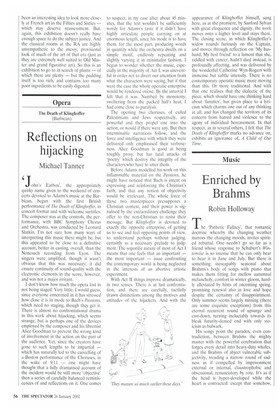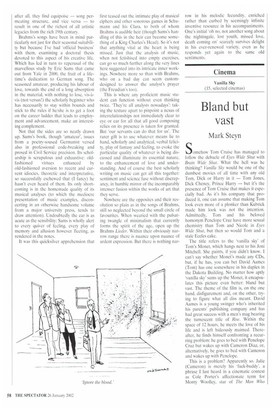Music
Enriched by Brahms
Robin Holloway
The 'Pathetic Fallacy', that romantic doctrine whereby the changing weather mirrors the changing moods, invites spirited rebuttal. One needn't go so far as a friend whose response to Schubert's Winterreise is so intense that he can only bear to hear it in June and July. But there is something inescapably seasonal about Brahms's body of songs with piano that makes them fitting for mellow autumnal melancholy, comfort in winter gloom, hardly alleviated by hints of oncoming spring, promising renewal also in love and hope despite the certainty of disappointment. Only summer seems largely missing (there are some exquisite exceptions) from this eternal recurrent round of upsurge and cast-down, turning ineluctably towards its bleak futurity-denied end with only stoicism as bulwark.
His songs point the paradox, even contradiction, between Brahms the mighty master with the powerful cerebration that forges every detail into heavy-duty wholes, and the Brahms of abject vulnerable subjectivity, treading a narrow round of sadness as if compelled by imprisonment external or internal, claustrophobic and obsessional, renunciatory by rote. It's as if the head is hyper-developed while the heart is contracted: except that somehow,
after all, they find equipoise — song permeating structure, and vice versa — to result in one of the richest of all artistic legacies from the rich 19th century.
Brahms's songs have been in mind particularly not just for their seasonal suitability but because I've had 'official business' with them, examining a doctoral thesis devoted to this aspect of his creative life. Which has led in turn to reperusal of the marvellous study by Eric Sams that came Out from Yale in 2000, the fruit of a lifetime's dedication to German song. The seasoned amateur, producing his labour of love, towards the end of a long absorption in the material, with nothing to lose, vis-avis (not versus!) the scholarly beginner who has necessarily to stay within bounds and stick to the rules if he/she is to get a foot on the career ladder that leads to employment and advancement, make an interesting complement.
Not that the sides are so neatly drawn up. Sams's book, though 'amateur', issues from a poetry-soused Germanist versed also in professional code-breaking and prosed in Civil Service precision. Its scholarship is scrupulous and exhaustive: old fashioned virtues enhanced by old-fashioned aversion to recent and current idiocies, theoretic and interpretative, so successfully eschewed that (I fancy) he hasn't even heard of them. Its only shortcoming is in the homemade quality of its musical analyses (to which the mediocre presentation of music examples, disconcerting in an otherwise handsome volume from a major university press, tends to draw attention). Undoubtedly the ear is as acute as the sensibility: Sams is wholly alert to every quiver of feeling, every play of memory and allusion however fleeting, as rendered in the notes.
It was this quicksilver apprehension that first teased out the intimate play of musical ciphers and other sonorous games in Schumann and his Clara, to both of whom Brahms is audible heir (though Sams's handling of this in the heir can become something of a King Charles's Head). So it's not that anything vital at the heart is being missed. Just that the analysis of music, when not fetishised into empty exercises, can go so much further along the very lines here suggested into its intricate inner workings. Nowhere more so than with Brahms, who on a had day can seem customdesigned to answer the analyst's prayer (the Freudian's too).
This is where any proficient music student can function without even thinking twice. 'They're all analysts nowadays': taking the texture apart to pinpoint a nexus of interrelationships not immediately clear to eye or ear for all that all good composing relies on its presence is taken for granted. But 'our servants can do that for us'. The rarer gift is to use whatever means lie to hand, scholarly and analytical, verbal felicity, play of fantasy and feeling, to evoke the particular quality of whatever is being discussed and illuminate its essential nature, to the enhancement of love and understanding. And of course the best scholarly writing on music can get all this together: sentiment and science fuse without discrepancy, in humble mirror of the incomparably intenser fusion within the works of art that they serve.
Nowhere are the opposites and their resolution so plain as in the songs of Brahms, still so neglected beyond the small circle of favourites. When wearied with the pulsating twangle of minimalism that currently forms the spirit of the age, open up the Brahms Lieder. Within their obviously narrow range there is nuance upon nuance of ardent expression. But there is nothing nar
row in his melodic fecundity, enriched rather than curbed by seemingly infinite inventive resource in his accompaniments. One's initial 'oh no, not another song about the nightingale, lost youth, missed love, death coming on' scarcely survives delight in his ever-renewed variety, even as he responds yet again to the same old sentiments.



















































































 Previous page
Previous page